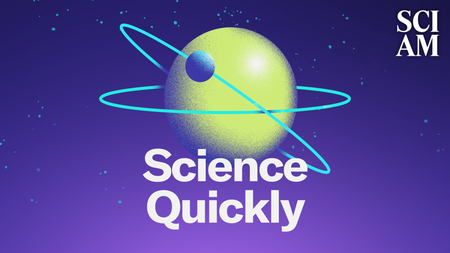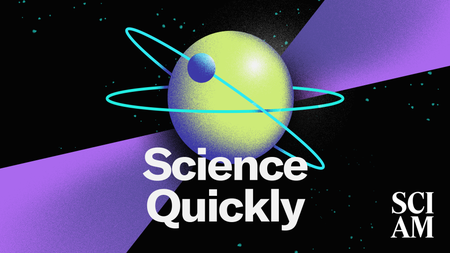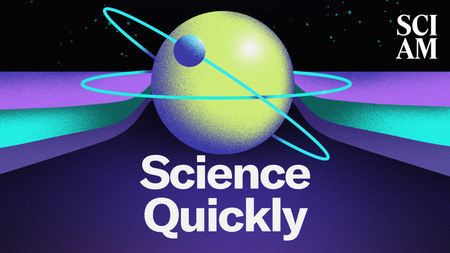
Unpacking the Mystery of Squirting: What Science Really Says
A mysterious and often debated aspect of human sexuality colloquially known as “squirting” sparks controversy. This episode explores what research reveals.
Jeff DelViscio is currently chief multimedia editor/executive producer at Scientific American. He is former director of multimedia at STAT, where he oversaw all visual, audio and interactive journalism. Before that, he spent more than eight years at the New York Times, where he worked on five different desks across the paper. He holds dual master's degrees from Columbia University in journalism and in earth and environmental sciences. He has worked aboard oceanographic research vessels and tracked money and politics in science from Washington, D.C. He was a Knight Science Journalism Fellow at the Massachusetts Institute of Technology in 2018. His work has won numerous awards, including two News and Documentary Emmy Awards.

Unpacking the Mystery of Squirting: What Science Really Says
A mysterious and often debated aspect of human sexuality colloquially known as “squirting” sparks controversy. This episode explores what research reveals.

There’s Nothing Small about this Nanoscale Research
We’re taking you inside MIT.nano, a clean laboratory facility that is critical to nanoscale research, from microelectronics to medical nanotechnology.

Robotics Researchers Bring The Electric State’s Cosmo to Life
A robotics researcher takes on the Russo brothers’ vision from the new movie The Electric State.

On COVID’s Fifth Anniversary, the U.S. Remains Vulnerable to Infectious Disease
On COVID’s fifth anniversary, the U.S. is facing an outbreak of tuberculosis in Kansas that makes strong public health systems as important as ever.

Saying Farewell to the Gaia Mission, Which Mapped the Milky Way
We look back on about 11 years of the Gaia spacecraft, now at the end of its mission to create the best map of the Milky Way.

Where Did Curly Hair Come From? Biological Anthropology May Provide Insights
Humans have a surprising lack of hair for mammals. Biological anthropology may provide insights into why the hair we have sometimes comes out curly.

The Air around Us Is Full of Life
Journalist Carl Zimmer chats about aerobiology and his new book Air-Borne: The Hidden History of the Life We Breathe.

When It Comes to Impending Asteroid 2024 YR4, Risk of Impact Is a Wait-and-See Question
News of an asteroid with a 2 percent chance of hitting Earth in 2032 made headlines. But is its fluctuating risk really cause for concern?

Why 2025 Is an Exciting Year in Heliophysics
From space weather to science missions, there’s a lot to be excited about in heliophysics this year.

What Happens to the Open Internet without Net Neutrality?
A U.S. federal court struck down the FCC’s enforcement of net neutrality. What does that mean for Internet users?

Mishandled Response to the Bird Flu Leaves U.S. Vulnerable to Outbreak
The U.S. government lost control of the bird flu because of a sluggish response and deference to industry.

A Death from Bird Flu, a Cosmic Kiss and Wildfires in L.A.
In this week’s news rundown, norovirus cases are up, a bird flu death is reported and Los Angeles has experienced devastating fires.

Conservation Efforts Are Bringing Pandas, Wolves and Panthers Back from the Brink
There are so many species facing extinction—but today we’re telling stories about the animals making a comeback and the conservationists working hard to help.

Today’s Conservationists Are Inspired by Homeland and Heritage
Modern conservationists are finding new ways to protect wildlife.

Audio and Imagery, Interpreted by AI, Are Improving Conservation Studies
Conservationists have access to massive amounts of data on wildlife—and machine learning is helping them make meaning out of them.

Why Are Zoos Controversial?
Though it may seem paradoxical, zoos can play a big role in modern conservation efforts.

Leaded Gasoline Tied to Uptick in Mental Health Disorders, and a Mysterious Outbreak Occurs in the DRC
A mysterious outbreak occurs in the Democratic Republic of the Congo, and researchers find evidence that exposure to leaded gasoline was linked to increases in mental illness. Plus, we discuss orcas wearing salmon as hats.

Why Anthony Fauci Is Concerned about Bird Flu and Public Division
“America’s Doctor” says that our common enemy is the danger posed by viruses, not each other.

RFK, Jr., Could Run the Agency That Oversees CDC, FDA and NIH. Here’s What That Means for Public Health
RFK, Jr., could restructure the CDC, FDA and NIH in pursuit of his flawed vision of public health. Plus, we discuss chimpanzees at play and the first-ever close-up image of a star.

Could AI Ghosts of Ancient Civilizations Help Us Connect with Bygone Cultures?
Social psychologists could turn artificial-intelligence-powered tools like ChatGPT on to writings from past cultures. Will this help us study ancient civilizations?

Unscheduled C-Sections May Depend on the Color of Your Skin
A study of births in New Jersey reveals a troubling disparity between unscheduled C-sections for Black people.

Mud Bath Really Does Make Baseballs Easier to Grip
Droughts in 48 of 50 U.S. states, evidence of microplastics mucking up wastewater recycling and the science of a baseball mud bath in this week’s news roundup.

Could Weight-Loss Treatments Lead to an Uptick in Scurvy?
We cover a 3.26-billion-year-old meteorite impact, the spread of bird flu and a scurvy case study that serves as a cautionary tale in this week’s news roundup.

What Do Societal Beauty Standards Have to Do with Breast Cancer?
An epidemiologist explores a troubling rise in early-onset breast cancer diagnoses and discusses the potential link to chronic exposure to endocrine disruptors.